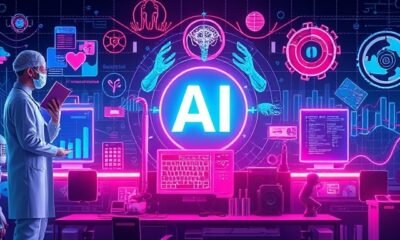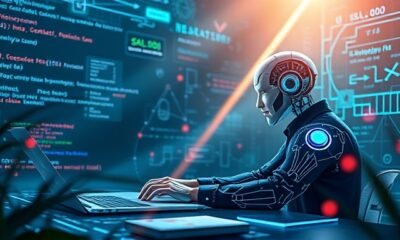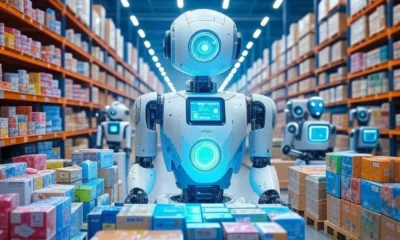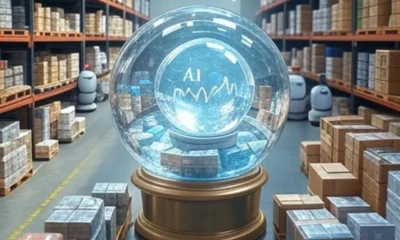Artificial Intelligence
Why Industry Applications & Trends Matter Today
Learn how I use AI across healthcare, manufacturing, retail, logistics, and finance to improve business performance. Explore key AI industry applications and trends shaping the future of work in the United States.

When I glance around me, I can notice that AI revolutionizes industries such as healthcare, retail, manufacturing more than ever. Doctors with the help of artificial intelligence tools can predict diseases in their early stages and robots can facilitate work in warehouses. This is not a science fiction anymore, this is a reality across the United States today.
Definition:
Industry applications and trends refer to the ways various business owners utilize the new technologies, such as AI, as well as the trends that can define their future.
You might be working at a logistic company, a medical facility, or a retail store, and becoming aware of these industry applications and trends makes a business person make better decisions in future.
These Are the Areas That AI Is Impacting Now Industry Applications:
Artificial intelligence can be found in almost every kind of industry, I deal with on a daily basis or even in deciding a business.
How important is AI in healthcare? It is transforming the process of diagnosis of diseases and the development of treatment plans in the hospitals of the country.
As far as my ideas about AI in screening are concerned, it can assist doctors to diagnose cancer at its early stages or even identify the state of a heart with the assistance of medical imaging machines. AI is also groundbreaking it has also transformed standard ways of treating people by giving them suggested meds depending on their unique genetics and their health history. Healthcare predictive analytics will enable me to comprehend the outcome of patients.
B. Manufacturing:
How AI is enhancing the manufacturing processes today? I have witnessed how robotics and automation have replaced the mundane jobs and increased the efficiency.
AI robotic arms build products, package goods and process materials far more quickly than manual systems. Another very strong application is predictive maintenance. Sensors on machines allow them to sense when a breakdown may occur and preempt it therefore saving a business time and expenses they could have incurred during that period.
Quality control with the use of AI guarantees that the products will be produced as per specification. With AI image recognition to identify any defects, the manufacturers can have an even greater consistency in their products.
C. E-Commerce and retail:
What are the reasons why AI is important in the retail and e-commerce world? Customized product suggestions enable me to find issues that I did not think I needed.
When I browse in online stores AI algorithms help me see products that best fit my interests, past purchases, and browsing decisions. This does not only enhance my experience but boost sales of businesses.
Inventory and supply chain activities are also done by AI. Artificial intelligence makes predictions on the demand of the products, monitor shipments and eliminate stored wastage of the products based on real-time analytics.
D. Transportation & Logistics:
What are the implications of AI in transportation and logistics now? I have apps with the AI to optimise my route and read about autonomous vehicles in the news.
AI-based route optimization helps companies save money spent on transportation by selecting the most optimal and fastest routes of delivery. The last-mile logistics is already experiencing the testing of autonomous delivery vehicles with AI systems in use across the United States.
Artificial intelligence enables me to avoid delays during rush hour. Systems re-route themselves according to weather, accidents, or conditions.
E. Finance:
What is the importance of AI in finance? I always make use of the AI system to detect fraud and believe in banks using AI risk management tools.
Fraud detection AI systemsare being used where millions of transactions are being tracked online to detect fraudulent activity even before it reaches my account. Algorithmic trading is an art of exploiting the AI to forecast the market changes and make trades before any human can possibly do. Finance is now smarter, quicker and safer thanks to these applications delivered to the business and regular users like me.
F. Agriculture:
What are the ways of AI changing farming and agriculture nowadays? Application of AI in precision farming aims at maximizing the yield of crops with fewer resources.
Through AI farmers can read the data of the soil, foresee the weather and the best time to plant anything with the precision of pin sharp. AI-based tracking of crops by drones, sensors and alerts enables farmers to detect problems in the crop such as pests or diseases in real-time and save their crop.
Through the development of AI in agriculture, I envisage that technology is aiding an increasing number of people to be fed with minimal consumption of resources such as water and fertilizers.
Emerging Trends in AI Industry Applications:
Another fact that I do not forget is how fast the trends of AI in the United States change across the industries. Being current is one of the ways of keeping business minds in line and in the future.
A. Generative AI Across Sectors:
How is generative AI changing industries today? I have witnessed it revolutionize the way content marketing and development of physical products are being done.
Marketing AI generates blog articles, videos as well as social media content based on available brand information, which is highly customized according to the tastes of the customers. This helps the businesses get in touch with audiences quicker and it saves time through me.
Generative AI also helps design and prototype products. I have seen firms develop product models literally without having made anything practically and this saves them much time and money.
B. Artificial intelligence and Sustainability projects:
What is the importance of AI to sustainability purposes? I daily witness companies trying to reduce carbon dioxide emissions and energy optimization through AI.
Looking at the tools related to carbon emission reduction run by AI, they allow factories to monitor expenditure of the energy and find more eco-friendly ways of production. These instruments allow companies to comply with higher U.S. ecological standards, and at a lower cost.
AI-driven energy optimization makes the industries automatically regulate the power consumption. Either lighting, heating, or operations of machines, AI makes use of resources efficient without the presence of a human operator.
C. Edge AI and Real-Time Decision Making:
What is edge AI, and why is it trending now? I use devices powered by edge AI that process data instantly without cloud dependency.
Edge AI means faster on-device processing, which improves real-time decisions. For example, self-driving cars rely on edge AI to react instantly while driving through busy U.S. city streets.
Disuse of cloud systems reduces insecurity in the applications of artificial intelligence and makes them more responsive. It is particularly helpful in case of healthcare and manufacturing where a split second can turn everything into waste.
D. Human and AI collaboration:
What is the role of AI in helping human workers and not in substituting them? I observe increasing numbers of companies that utilize human in the loop artificial intelligence to make better decisions.
Human in the loop IA will enable me to guide or humanly correct AI decisions in the event of problem situations. It develops safer, more precise systems when it comes to fields such as health care and finances.
AI makes workforce more productive and increases it instead of taking work. I have witnessed how AI-based tools allow handling a variety of complex tasks, used by warehouse workers, diminishing manual errors and liberating them to carry out other tasks of greater value.
Issues that Companies Face in Using Artificial Intelligence Solutions:
Although it is obvious that AI can bring many benefits, nowadays companies encounter tangible difficulties using such technologies in various sectors.
A. Legacy systems:
What makes it challenging to integrate AI with the older systems on business level? I have observed that most companies have difficulties coping with old technologies and software.
Using older systems will only lead to the creation of data silos wherein the data will get locked in different departments that do not interact. This slows down and makes ineffective the use of AI.
There are also system compatibility problems that create frustrations. AI tools do demand current infrastructure, but a good number of U.S. companies still depend on the infrastructure installed decades before.
B. Data Privacy and Safety:
What are some of the ways through which companies can figure out how to achieve a balance between the information requirements of AI and privacy legislation? I always observe this dilemma in the field of healthcare, finance and retail.
AI applications require a lot of data in order to become effective in their predictions, but that creates a privacy issue amongst the companies and customers alike. It is easy to get lost in satisfying the demands of AI and compliance with regulations such as HIPAA or GDPR.
This is important as well as maintaining high security. Security threats are posed to AI systems which hold confidential customer or business data and can break down reputations and economic stability.
C. Workforce skills gap:
Why is sourcing AI talent the big issue of today? I am aware that companies in the United States experience this shortage of skilled labour on a regular basis.
It is just that there is a lack of skilled personnel who are familiar with artificial intelligence technology and the industry in which the said AI technology is required. Businesses have been finding it hard to employ people, who understand how to implement, operate, or construct AI systems.
The demand of AI training is encouraged rapidly. Companies have to invest in the training of current employees to ensure that they do not lag behind AI development in favor of their rivals.
What’s Next: Predictions for AI Industry Applications in the Next 3–5 Years:
What will be the future of AI?
Development of Autonomous People-free Factories:
Will fully autonomous factories be the reality? Factories fully automated with the help of AI and robotics will perform even quality control and schedule productions without any human input.
Independent factories assist small and large scale manufacturers compete effectively in the global market without incurring high costs to comply with drastic laws.
Artificial intelligence Becoming a Normal Part of Small and Medium-Sized Enterprises (SMBs):
What will be the rate of the been initiated growth of AI in small business? I would bet that in the near future, AI tools will become a norm even to SMBs.
I think the first functions regarding AI that SMBs invest in are marketing, inventory management, and customer service. Such shift evens the power between the players. It enables the local businesses such as myself to compete with the larger brands and enhance the quality of service and its cost effectiveness.
Customer Service: Hyper-Personalization:
Personalization of shopping is already done by AI, yet I imagine that in the future, every customer experience will be made to feel special. Be it chatbots or email response, AI-based systems will intuitively change their tone and timing, as well as offers, depending on the profiles extracted about the user. Hyper personalization makes business more lucrative and customer-loyal.
Conclusion: Why Staying Updated on AI Industry Trends Matters:
Efficiency and the quality of services rendered in healthcare, manufacturing, retail, transportation, finance, and agriculture are the examples of how AI is beneficial. From generative AI in marketing to fully autonomous factories, these trends shape how businesses operate now and will grow in the next few years.
I will always advise to keep yourself updated, go to a professional in the industry, or even experiment with the AI tools that would suit your business requirements. What AI application can you foresee having the biggest impact in your industry? Do you have AI tools implemented in your business, or have not you decided to choose yet? Which of the future AI trends sound most exciting or challenging to you? To hear your opinion in the comments and don t hesitate to share this article in case you learned something new today!
-

 Artificial Intelligence8 months ago
Artificial Intelligence8 months agoWhat is Artificial Intelligence? A Comprehensive Guide for Businesses and Enthusiasts
-

 Artificial Intelligence6 months ago
Artificial Intelligence6 months agoHow to Use Grok AI: A Complete Guide
-

 Artificial Intelligence8 months ago
Artificial Intelligence8 months agoUnlocking the Power of Artificial Intelligence Tools
-

 Artificial Intelligence7 months ago
Artificial Intelligence7 months agoWhat is DeepSeek? Revolutionizing AI with Cutting-Edge Solutions
-

 Artificial Intelligence3 months ago
Artificial Intelligence3 months agoAI Technologies in Warehouse Automation:
-

 Artificial Intelligence4 months ago
Artificial Intelligence4 months agoMeta’s AI Push: The Standalone Assistant App Set to Rival ChatGPT
-

 Artificial Intelligence3 months ago
Artificial Intelligence3 months agoHow Artificial Intelligence is Revolutionizing Logistics:
-

 Artificial Intelligence3 months ago
Artificial Intelligence3 months agoPredictive Analytics for Demand Forecasting:


